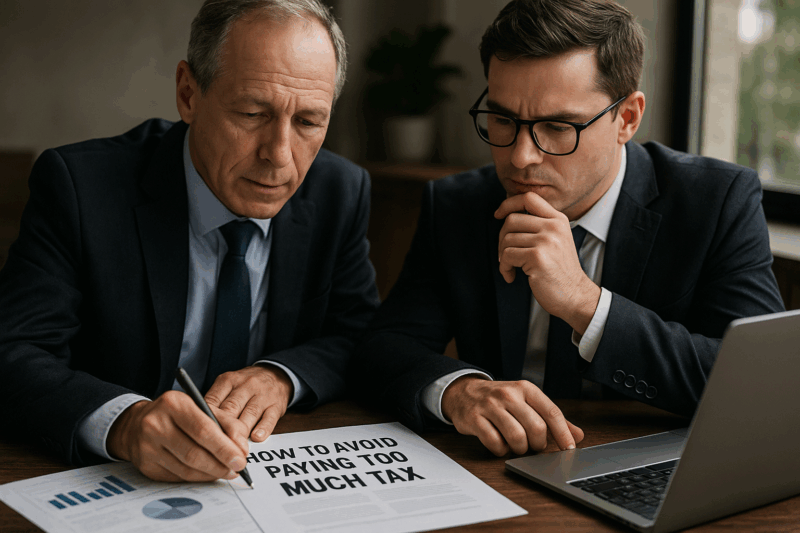There are a growing number of people in Australia wanting to create wealth by undertaking a small property development.
Unfortunately, many people attempt it when they don’t have the knowledge or the know-how, and they end up financially worse off than they were before.
Others, while clearly capable of managing the project, don’t set up the ownership structures correctly from the outset and wind up forking out much of their profits in taxes.
Of course, it doesn’t have to be that way.
Let me explain further.

Two are better than one
Friends Mark and Paul wanted to build a duplex and each holds one for investment after completion.
The pair had the skills to successfully complete the duplex, plus they also had the nous to come and see me before they even bought the site because they were worried – and rightly so – about the tax implications.
If they had simply pushed forward with the project, without any expert advice, their hard work could have been fornix.
You see, by developing the site after purchasing it in both of their names, they would have wound up technically owning both properties jointly, when they wanted to own one each.
The thing is, changing the names – and the ultimate ownership – of each property would trigger income tax, GST, as well as stamp duty liabilities.
In fact, by my calculation, they would each would have been liable for more than $200,000 in taxes given the end profit of the project was about $1.2 million.
That scenario would mean a huge cut in profit for both of them and probably plenty of sleepless nights wondering how it all went so horribly wrong.
As I always say, a failure to plan is a plan to fail, which would have been the outcome for Mark and Paul if they hadn’t come and seen me.
Same, same but different
At the end of the day, one of the most important things in a joint venture partnership is trust, which they clearly had.
No one should ever enter into a JV agreement without feeling comfortable with their partner, because it probably won’t end well if they are having reservations at the beginning.
Like with most things tax-related, there are ways that a successful outcome can be achieved – as long as you work with a professional who knows the various ins and outs of the relevant myriad pieces of legislation.
In this situation, therefore, we developed a strategy for Mark and Paul that saw them enter into a formal agreement together that would see them develop the project together and then retain one property each after completion.
The agreement needed to satisfy a number of commercial requirements and responsibilities, but it also needs to manage tax implications, so that meant it was more of a tax management agreement than a commercial one.
After the successful completion of the project, Mark and Paul were the happy owners of one property each without having to pay hundreds of thousands of dollars in unnecessary tax.
We also created a strategy to allow more streamlined refinancing to an investment loan after construction.
What were the lessons learned?
The most valuable thing that Mark and Paul did in this project was get professional advice before they even purchased the site.
In fact, that decision alone possibly saved them about $400,000!
Seeking expert advice ensured that we considered a number of different ownership structures, such as using a trust, long before they signed a contract of sale.
While we resolved to buy the site in their personal names for a variety of reasons, we considered a number of different avenues to ascertain which one was the best for their circumstances.
If they had gone ahead and bought the site and then come and see me afterwards, well, the options would have been far more limited, which would likely cost them money.
As it was, by using the services of an expert early, they had one less thing to worry about long before the first sod was even turned.
What about you?
If you’re a business owner, a professional, or an established property investor why not have a chat with me about your personal circumstances?
You deserve your own private wealth advisor to create a Strategic Wealth Plan for your personal needs.
And this is especially important if you’re considering a joint venture like Mark and Paul.
Click here now and find out how Metropole Wealth Advisory could help you.
Having a Strategic Wealth Plan means you’re more likely to achieve the financial freedom you deserve and desire because we’ll help you:
- Define your personal, financial, and business goals;
- See whether your goals are realistic, especially for your timeline;
- Measure your progress towards your goals – whether your investments or business is working for you, or if you’re working for it;
- Find ways to maximise your wealth creation;
- Identify risks you hadn’t thought of.
And the real benefit is you’ll be able to grow your wealth faster and more safely than the average investor and leave a legacy.
Click here now, to find out more about our range of services at Metropole Wealth Advisory and organise a time for Ken Raiss to formulate a Strategic Wealth Plan for you, your family or your business.














